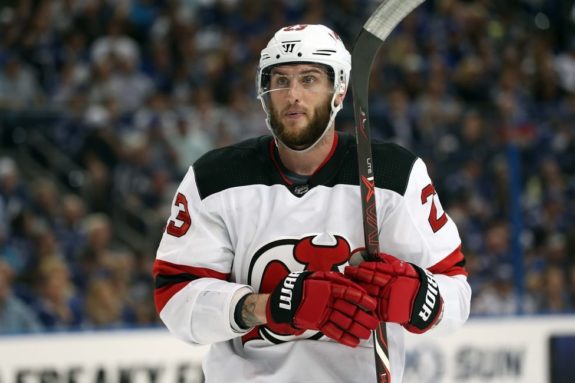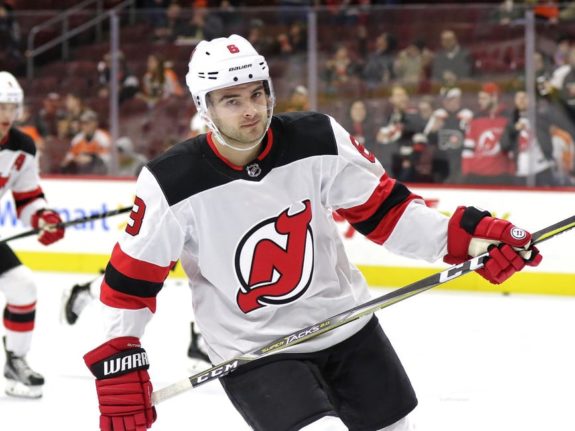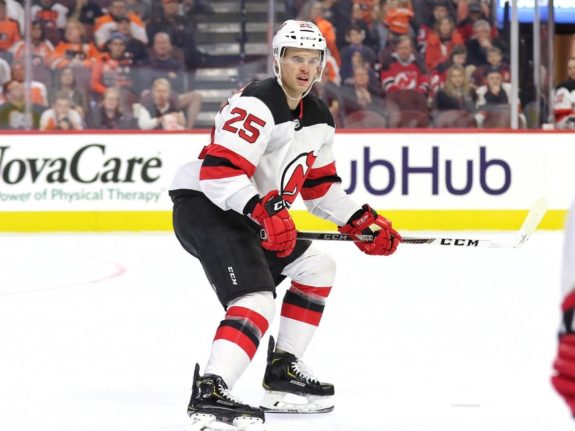The New Jersey Devils have more than a few players headed for restricted free agency this summer, with the most notable being Will Butcher and Pavel Zacha. The decision to re-sign them should be easy enough, but that won’t be the case for some of their other pending RFAs. Which players will general manager Ray Shero choose to re-sign? And which should he let go to unrestricted free agency?
The Devils’ Biggest RFAs
Pavel Zacha
Zacha got off to a horrible start this season, with no points in his first 10 games played, and it wasn’t like he was getting unlucky, either. He only had 10 shots on goal in those 10 games, which is not close to enough for someone in a top-six role. It eventually forced the Devils’ hand as they sent him to the AHL to try and help him turn things around.
Even after Zacha returned to the NHL, it took him a while to get things going. He had four points in his next 18 games, and it was starting to look like his season would be another lost cause. But he started to pick up his play to close the season, with 20 points in his final 30 games, including nine in his last nine games of the season. However, some of that was due to his 15.7 shooting percentage, which was well above his career average of 9.8 percent.

Zacha may have had some better luck to close out the season, but he did look like a more confident player down the stretch. Unless he’s traded, he’ll be back in a Devils’ uniform next season. So should they be willing to go long term? Or should they go for a shorter-term contract?
Bridge deals aren’t as common as they used to be, but that’s what the Devils’ end game should be with Zacha. I’m skeptical about his close to the season, and I think the Devils should be, too. A contract for around 2-3 years seems like the right way to go, and it shouldn’t cost more than a couple of million per season. Even though his offense is limited, he’s still a valuable defensive forward and is one of the team’s best penalty killers.
Stefan Noesen
Noesen was one of the Devils’ most surprising forwards in 2017-18, but he took a big step back this season. After finishing with 27 points a season ago, he finished with eight in 41 games played this season. Part of that was due to injuries, but Noesen’s underlying stats fell dramatically at five-on-five.
His Corsi for percentage (CF%) dropped from 51.62 percent last season to 45.65 percent this season. His expected goals for percentage (xGF%) also dropped from 53.49 percent to 49.40 percent. And to top it off, he had a goals above replacement (GAR) of minus-5.2 in all situations (via Evolving Hockey), which is way off from the 6.8 GAR he posted last season.

It’s pretty clear it was not a good season for Noesen. And with the Devils needing to free up roster space for their young players and any further additions they make, it looks like his time with the organization is drawing to an end. He played a significant part in them making the playoffs last season, and we’ll probably look back on his time with the Devils fondly. He’s still more than capable of playing in the NHL, but it seems it’ll have to be with another team.
John Quenneville
Quenneville is in a weird spot with the organization. He was the team’s first-round pick in 2014 but has yet to crack the NHL as a regular. He finished this season with one point in 19 games but did produce in the AHL, finishing with 39 points in 37 games. That hasn’t translated to the NHL, and he’ll be 23 years old by the start of next season. So what should the Devils do?
Related – Devils’ Pending UFAs: Who Stays and Who Goes?
I think a fresh start elsewhere is in Quenneville’s best interest, and there are a couple of ways that can happen. The first and simplest route is not tendering him a qualifying offer, allowing him to become an unrestricted free agent. He can then choose to sign with any team, but that may not be the Devils’ best option. It’s easier said than done, but if Shero can find a trade partner willing to take on Quenneville — most likely in a trade package — it would benefit everyone. They’d get something back for him, while he gets to hit reset on his NHL career with a new team.
Will Butcher
Butcher is the Devils’ most prominent RFA this summer, and he’s probably going to get the most money, too. His numbers fell from his rookie season — both his counting totals and underlying stats — but it’s not like he played poorly, which is something I’ve seen mentioned a bit by fans on social media.

He finished the season with a 49.87 CF%, ranked third on the team, and had an xGF% of 52.24 percent, ranked fifth on the team. Butcher also finished with a GAR of 9.8, which was better than Rasmus Dahlin, Miro Heiskanen, and Jacob Trouba. It’s also the exact GAR he finished with as a rookie in 2017-18, so the notion that he didn’t play well seems overblown.
His production may have taken a step back, from 44 points to 30 points, but it’s not indicative of his play. Butcher also played against tougher competition and saw fewer offensive zone starts. I think he’s a capable second-pair defenseman, and the Devils should pay him like one, but it shouldn’t be a bridge deal. He’s already 24 years old, and I think Shero would be smart to give him a long-term deal that eats up some UFA years. A contract similar to Damon Severson’s six-year, $25 million deal would make sense.
Who Else is Left?
Defensemen Mirco Mueller, Connor Carrick, and goalie Cam Johnson are the Devils’ remaining RFAs. They acquired Carrick in a trade that sent Ben Lovejoy to the Dallas Stars in February, and he showed some promise. His underlying numbers weren’t great (44.35 CF%, 47.27 xGF%), but he can move the puck a bit and adds some offense. He’s a solid depth defenseman, so I imagine the Devils bring him back on a short-term contract.
Related: All-Time Best Player From Every NHL Team
Mueller’s play won’t wow anyone, but he was decent in the minutes he logged. He finished the season with 11 points in 53 games and posted good numbers on the penalty kill. He doesn’t provide much offense, and he’s not great at transitioning the puck. Ty Smith and the recently signed Jeremy Davies are also breathing down his neck for playing time as left-handed defensemen, so that could push Mueller out. I’d be OK with him returning on a short-term deal, but I can also see the Devils moving on to free up space for Davies or Smith.

Johnson spent a majority of this season in the AHL, and his numbers were not good. He finished with a .872 save percentage, ranked 47th in the league for qualified goalies. The Devils just signed 2017 fifth-round pick Gilles Senn to an entry-level contract, and they have Evan Cormier signed, too. Senn is already 23 years old, and he’s as good as a lock to play in the AHL with Cormier sharing the net. That makes Johnson the odd man out, so I don’t expect him to return for 2019-20.
* * *
Advanced stats from Natural Stat Trick, GAR from Evolving Hockey